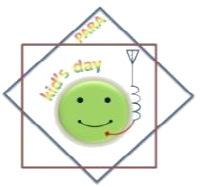1.1 Introduce young children to the Ham Radio hobby
1.2 Ham radio operators to Elmer new comers to the hobby
1.3 Provide venue for ham radio family event (Parents, Uncles, Aunties, Cousins operating with children)
1.4 Children to contact as many ham radio stations as possible
1.5 Ham radio operators to contact as many stations operated by children
A child with the microphone and to use a “colored” tuned circuit

5.1 Definition of PARTICIPANT
5.1.1 A participant can be a child of not more than fifteen (15) years of age
5.1.1.1 A child being Elmered to amateur radio should be supervised by a licensed amateur radio operator. The frequencies to be used are based on the license privileges of the radio amateur supervising the child/children. The callsign to be used will be the callsign of the licensed amateur radio operator. If the activity is being done in a radio club, the callsign of the club station must be used.
5.1.1.2 Should a child be licensed and opts to use his/her registered equipment, he or she may use his or her own amateur callsign to participate. Frequencies used should be within the license privileges of the child
5.1.1.3 Should a licensed child wants to have QSOs on frequencies beyond his/her license privileges, he or she must be supervised by a radio amateur having privileges to operate on the desired frequencies. The callsign of the supervising radio amateur is to be used.
5.1.2 A participant can be a licensed radio amateur supervising the activity of a child. The QSO credits/score of the child will be the same QSO credits /score of the supervising licensed radio amateur. Please refer to Item 5.1.1.1 and 5.1.1.3 above.
5.1.2.1 With this, a station can submit multiple log sheet entries based on the number of children operating the station and the categories of this event. Please refer to the Category section of these rules.
5.1.3 A participant can be a licensed radio amateur operating within their frequency privileges and providing QSOs to remote Kids' Day stations.
5.2 A participating station with a special event callsign MUST secure a permit from the NTC prior to the event.
5.3 Contacts via repeaters are allowed.
5.4 Contacts on Echolink are allowed but limited to a physical radio being used by the participant as medium to transmit the signal.
5.5 Each QSO with a different child is a unique and distinct QSO.
6.1 Kids' Day Station - the participating entry and log sheet submission is done by an individual child. Each child is a unique and distinct participant regardless of the callsign that was used during the event.
6.2 Sponsor Station ELMER - the participating entry and log sheet submission is an aggregate of the various log sheets of the individual Kids' Day Station which the licensed radio amateur supervised. The log submission is a direct copy of the individual log sheets of the children he/she has supervised.
6.3 Remote Station ELMER - the participating entry and log sheet submission should contact at least three (3) Kids' Day Stations within the twelve (12) hour period. The participant may also contact other amateur radio stations.
7.1 Kids' Day Station should give an RS(T) report and his/her age
7.2 Remote Station ELMER should give an RS(T) and the word ELMER
8.1 Each 2-way QSO with a Kids' Day Station participant - 10 points
Note: Each child in an amateur radio station is a distinct and unique Kids' Day Station participant
8.2 Each 2-way QSO with a Remote Station ELMER - 5 points
8.3 2-way QSO of a Remote Station ELMER with another amateur radio station – 1 point
Colored certificates will be given to the participants by fulfilling the following criteria:
9.1 Kids' Day Station Basic Certificate - participating child should at least be able to have a twenty five (25) points
9.2 Kids' Day Station Advanced Certificate - participating child should at least be able to have a fifty (50) points
9.3 Kids' Day Station Platinum Certificate - participating child should at least be able to have one hundred (100) points
9.4 Sponsor Station ELMER Certificate- the participating entry should at least have one hundred (100) points. The points are aggregated scores from each child's log sheet.
9.5 Remote Station ELMER Certificate- the participating entry should at least have one hundred (100) points
10.1 Each participant is to fill-out the entry form. An amateur radio station may submit multiple entries. For example: a station has three (3) children being supervised. That station can submit three (3) Kid's Day Station Entries and one (1) Sponsor Station Elmer entry.
10.2 A log sheet sample is provided with this RULES and GUIDLINES.
10.3 Each child must fill-out his/her respective log sheet. The ELMER can help in accomplishing the child's log sheet. The respective and individual log sheet will be a basis for the certificate preparations
10.4 The log sheets must be submitted in this excel format and e-mailed to para1932@gmail.com
Note: Log submission provides the individual / club station a venue from proof of amateur activity which is a pre-requisite to ARSL / RAOC renewal.
Log sheets are to be emailed on or before August 20, 2016, 12 noon (0400 UTC).
12.1 Violation of amateur radio rules and regulations
12.2 Violation of amateur radio rules and regulations of the event
Reminder : "Kung anong gawin ng nakakatanda ay gagayahin ng bata."
12.3 Action and decision of the PARA Contest Committee are official and final.